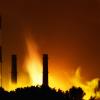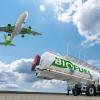
Air pollution is currently the largest environmental risk factor for human health globally and can be linked to several million cases of premature deaths every year. A new study however shows that it is possible to achieve clean air worldwide with fundamental transformations of today’s practices in many sectors, supported by strong political will.
There is strong scientific evidence that air pollution causes negative health impacts even below the present World Health Organization (WHO) guideline values, especially for fine particles (PM2.5). In fact, the current WHO guideline value for PM2.5 - which is exceeded by more than a factor of 10 in many parts of the world, especially in developing countries - is often considered unattainable.
The new study, published in Philosophical Transactions A, a journal of the Royal Society, aimed to examine the interplay of key determinants of air pollution (e.g., economic growth, technological development, environmental policy interventions) in the past, and what this means for the future. Building on the insights obtained from the first part of the study, the authors explored whether it would be conceivable that clean air could be achieved worldwide, and what it would take to achieve this. The paper forms part of a special theme issue of the journal, which contains a series of papers by prominent academics, and aims to provide an overview of global air quality and the policies developed to mitigate its effects.
The authors identified key factors that contributed to historic air pollution trends in different world regions, outlined conceivable ranges of their future development, and examined their interplay on global air quality in the next decades. Their efforts resulted in a first integrated perspective on achieving clean air around the world by combining different policy areas beyond air pollution.
“Policy interventions were instrumental in decoupling energy-related air pollution from economic growth in the past, and further interventions will determine future air quality,” explains lead author and IIASA Air Quality and Greenhouse Gases Program Director, Markus Amann. “Theoretically, a portfolio of ambitious policy interventions could bring ambient PM2.5 concentrations below the WHO air quality guideline in most parts of the world, except in areas where natural sources such as soil dust, contribute major shares to, or even exceed the current guideline value.”
Achieving clean air, which would save millions of premature deaths annually, needs integration over multiple policy domains, including environmental policies focusing on pollution controls, energy and climate policies, policies to transform the agricultural production system, and policies to modify human food consumption patterns. However, the authors emphasize that none of these policy areas alone can deliver clean air, and interventions need to be coordinated across sectors. In addition, such policy interventions would simultaneously deliver a wide range of benefits on other policy priorities, while also making substantial contributions to human development in terms of the Sustainable Development Goals.
“Even if WHO air quality standards are currently exceeded by more than a factor of 10 in many parts of the world, clean air is achievable globally with enhanced political will. The required measures, in addition to their local health benefits, would also contribute to the long-term transformational changes that are required for global sustainable development,” Amann concludes.
Reference:
Amann M, Kiesewetter G, Schöpp W, Klimont Z, Winiwarter W, Cofala J, Rafaj P, Höglund-Isaksson L, et al. (2020). Reducing global air pollution: the scope for further policy interventions. Philosphical Transactions A DOI: 10.1098/rsta.2019.0331 [pure.iiasa.ac.at/16750]
News

22 July 2024
Are sustainable aviation fuels truly sustainable?

17 July 2024
Forests endure as carbon sink despite regional pressures

16 July 2024
